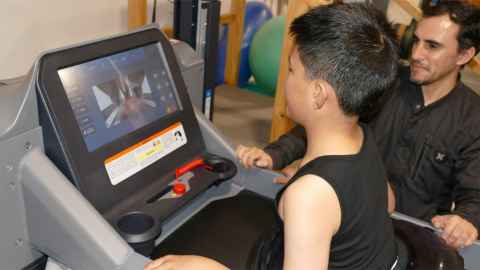Scientists seek children with Cerebral Palsy for anti-gravity walk
5 July 2023
Anti-gravity training, similar to space-like walks, could help children with neurological and physical impairments improve their muscle coordination, strength and mobility.

An anti-gravity study led by Dr Pablo Ortega-Auriol, Research Fellow at the Auckland Bioengineering Institute and Department of Exercise Sciences Waipapa Taumata Rau, University of Auckland, is hoping to reveal and promote new muscle coordination patterns which could increase the quality of life for children living with cerebral palsy.
Pablo Ortega-Auriol says “Muscle coordination is necessary to perform every movement we do. When you have a motor impairment, gravity becomes a big problem as it takes a lot of energy to compensate. By providing body weight support, muscles require less contraction, and they have a chance to alter their coordination strategy and improve their performance.”
Dr Ortega-Auriol is looking at the coordination between muscles and muscle patterns to identify the primary movements of walking.
"The brain controls movement using muscle synergies. An analogy is primary colours, red, blue and yellow. If you have three primary colours, you can use them in combination to get any colour you want. Brain-muscle control is the same. You have primary movements, and if you combine them, you can get the full range of movement.
"The idea is to identify a template on how healthy children walk. There are some differences in muscle patterns for children with neurological complications. We want to see if children with neurological disorders can get those muscle patterns closer to the healthy template.”

The anti-gravity study builds on encouraging work from the University of Auckland which showed stroke patients with impaired movement were able to create new muscle coordination patterns, reach further away and develop a wider range when they were supported.
Dr Ortega-Auriolis now recruiting children aged from eight to 15 years old with cerebral palsy (GMFCS I, II, or III) to take part.
“It is a big commitment but once that baseline data is established, the plan is to develop a training programme as a rehabilitation tool.”
The anti-gravity study is part of a larger project of the musculoskeletal modelling group of the Auckland Bioengineering Institute developing strategies to improve walking in neurologically impaired populations and funded by The Friedlander Foundation.
Anyone interested in participating or who has additional queries about the anti-gravity treadmill study can contact Dr Ortega-Auriol p.ortegaauriol@auckland.ac.nz or April Ren a.ren@auckland.ac.nz.
Media enquiries
Megan Fowlie
M: 022 301 0334
E: megan.fowlie@auckland.ac.nz